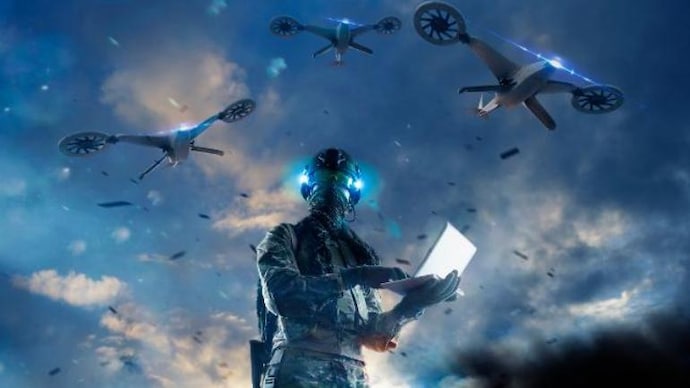In today’s fast-paced world, AI and military superpowers are becoming increasingly intertwined. As countries race to develop cutting-edge technologies, the integration of artificial intelligence (AI) in military applications has taken center stage. From enhancing strategic capabilities to reshaping global defense dynamics, AI is proving to be a game-changer for military superpowers worldwide.

The Rise of AI in Military Operations
The past decade has seen a remarkable surge in the adoption of AI technologies within military operations. This transformation is driven by the need for more efficient and accurate decision-making processes. AI algorithms can quickly analyze vast amounts of data, providing military leaders with actionable insights that can significantly impact the outcome of conflicts.
AI-Driven Decision Making
One of the most significant advantages of AI in the military is its ability to enhance decision-making processes. By leveraging machine learning and data analytics, militaries can predict potential threats, assess risks, and develop strategic responses with unprecedented speed and accuracy. This capability allows for more informed decisions, ultimately leading to more effective military operations.
AI in Surveillance and Reconnaissance
AI-powered surveillance systems are revolutionizing the way military superpowers conduct reconnaissance missions. Advanced AI algorithms can process real-time data from various sources, such as satellites and drones, to identify potential threats and monitor enemy movements. This technology enhances situational awareness, enabling military forces to respond swiftly and effectively.
AI-Enabled Autonomous Systems
The development of autonomous systems is another area where AI is making a significant impact. From unmanned aerial vehicles (UAVs) to autonomous ground vehicles, AI-driven technologies are changing the landscape of modern warfare. These systems offer numerous advantages, including reduced human casualties and increased operational efficiency.
Unmanned Aerial Vehicles (UAVs)
UAVs, commonly known as drones, have become an integral part of military operations. Equipped with AI-driven capabilities, these vehicles can perform a wide range of tasks, from reconnaissance missions to targeted strikes. The use of UAVs reduces the risk to human pilots and allows for more precise and efficient military operations.
Autonomous Ground Vehicles
Autonomous ground vehicles are also gaining traction in military applications. These AI-powered systems can navigate complex terrains, transport supplies, and even engage in combat scenarios. By minimizing the need for human intervention, autonomous ground vehicles enhance operational flexibility and reduce the risk to military personnel.
AI in Cyber Warfare
As cyber threats become more sophisticated, military superpowers are turning to AI to bolster their cybersecurity defenses. AI algorithms can detect and respond to cyberattacks in real-time, mitigating potential damage and safeguarding critical infrastructure.
AI-Powered Cyber Defense
AI-powered cyber defense systems can identify patterns and anomalies in network traffic, allowing military organizations to proactively address potential threats. By leveraging machine learning, these systems can continuously adapt to evolving cyber threats, ensuring robust protection against malicious attacks.
Offensive Cyber Capabilities
In addition to defensive applications, AI is also being used to develop offensive cyber capabilities. Military superpowers can deploy AI-driven tools to infiltrate and disrupt enemy networks, gaining a strategic advantage in cyber warfare.
Ethical Considerations of AI in Military Applications
While the integration of AI in military operations offers numerous benefits, it also raises ethical concerns. The use of autonomous weapons and AI-driven decision-making processes has sparked debates about accountability and the potential for unintended consequences.
Autonomous Weapons and Accountability
One of the primary ethical concerns surrounding AI in the military is the use of autonomous weapons. These systems can independently make decisions to engage targets, raising questions about accountability in the event of unintended harm. As military superpowers continue to develop AI-driven technologies, it is crucial to establish clear guidelines and regulations to address these concerns.
Ensuring Compliance with International Law
Another ethical consideration is the need to ensure compliance with international law. As AI technologies evolve, military superpowers must work together to establish frameworks that govern the use of AI in warfare, ensuring that these technologies are used responsibly and in accordance with international norms.
The Future of AI and Military Superpowers
The integration of AI in military operations is poised to reshape the future of warfare. As military superpowers continue to invest in AI-driven technologies, the potential for innovation and strategic advantage is immense. By embracing AI, military organizations can enhance their capabilities, improve decision-making processes, and ultimately achieve greater success in conflict scenarios.
Continued Investment in AI Research and Development
To stay ahead of the curve, military superpowers must continue to invest in AI research and development. By fostering innovation and collaboration, these nations can unlock the full potential of AI technologies and maintain their strategic advantage in an increasingly competitive global landscape.
Collaboration and Partnership
Collaboration and partnership between military superpowers and technology companies are essential for the successful integration of AI in military operations. By working together, these entities can develop cutting-edge solutions that address the unique challenges of modern warfare.
Conclusion
The intersection of AI and military superpowers is transforming global defense strategies. As countries continue to invest in AI-driven technologies, the potential for innovation and strategic advantage is immense. By embracing AI, military organizations can enhance their capabilities, improve decision-making processes, and ultimately achieve greater success in conflict scenarios. For more insights on AI in the military, check out this article.

FAQ
What are the benefits of AI in military operations?
AI enhances decision-making, improves surveillance and reconnaissance, enables autonomous systems, and strengthens cybersecurity defenses.
How are autonomous systems changing military operations?
Autonomous systems, such as drones and ground vehicles, reduce human risk and increase operational efficiency in military operations.
What ethical concerns are associated with AI in the military?
Ethical concerns include accountability for autonomous weapons and ensuring compliance with international law. It’s crucial to establish clear guidelines and regulations.

